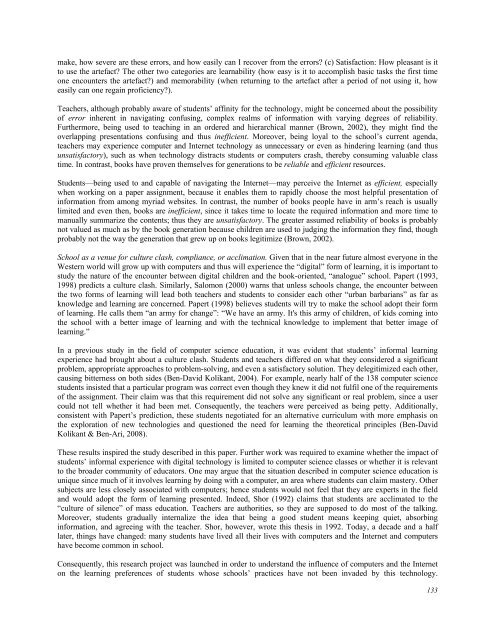Download - Educational Technology & Society
Download - Educational Technology & Society
Download - Educational Technology & Society
You also want an ePaper? Increase the reach of your titles
YUMPU automatically turns print PDFs into web optimized ePapers that Google loves.
make, how severe are these errors, and how easily can I recover from the errors? (c) Satisfaction: How pleasant is it<br />
to use the artefact? The other two categories are learnability (how easy is it to accomplish basic tasks the first time<br />
one encounters the artefact?) and memorability (when returning to the artefact after a period of not using it, how<br />
easily can one regain proficiency?).<br />
Teachers, although probably aware of students’ affinity for the technology, might be concerned about the possibility<br />
of error inherent in navigating confusing, complex realms of information with varying degrees of reliability.<br />
Furthermore, being used to teaching in an ordered and hierarchical manner (Brown, 2002), they might find the<br />
overlapping presentations confusing and thus inefficient. Moreover, being loyal to the school’s current agenda,<br />
teachers may experience computer and Internet technology as unnecessary or even as hindering learning (and thus<br />
unsatisfactory), such as when technology distracts students or computers crash, thereby consuming valuable class<br />
time. In contrast, books have proven themselves for generations to be reliable and efficient resources.<br />
Students—being used to and capable of navigating the Internet—may perceive the Internet as efficient, especially<br />
when working on a paper assignment, because it enables them to rapidly choose the most helpful presentation of<br />
information from among myriad websites. In contrast, the number of books people have in arm’s reach is usually<br />
limited and even then, books are inefficient, since it takes time to locate the required information and more time to<br />
manually summarize the contents; thus they are unsatisfactory. The greater assumed reliability of books is probably<br />
not valued as much as by the book generation because children are used to judging the information they find, though<br />
probably not the way the generation that grew up on books legitimize (Brown, 2002).<br />
School as a venue for culture clash, compliance, or acclimation. Given that in the near future almost everyone in the<br />
Western world will grow up with computers and thus will experience the “digital” form of learning, it is important to<br />
study the nature of the encounter between digital children and the book-oriented, “analogue” school. Papert (1993,<br />
1998) predicts a culture clash. Similarly, Salomon (2000) warns that unless schools change, the encounter between<br />
the two forms of learning will lead both teachers and students to consider each other “urban barbarians” as far as<br />
knowledge and learning are concerned. Papert (1998) believes students will try to make the school adopt their form<br />
of learning. He calls them “an army for change”: “We have an army. It's this army of children, of kids coming into<br />
the school with a better image of learning and with the technical knowledge to implement that better image of<br />
learning.”<br />
In a previous study in the field of computer science education, it was evident that students’ informal learning<br />
experience had brought about a culture clash. Students and teachers differed on what they considered a significant<br />
problem, appropriate approaches to problem-solving, and even a satisfactory solution. They delegitimized each other,<br />
causing bitterness on both sides (Ben-David Kolikant, 2004). For example, nearly half of the 138 computer science<br />
students insisted that a particular program was correct even though they knew it did not fulfil one of the requirements<br />
of the assignment. Their claim was that this requirement did not solve any significant or real problem, since a user<br />
could not tell whether it had been met. Consequently, the teachers were perceived as being petty. Additionally,<br />
consistent with Papert’s prediction, these students negotiated for an alternative curriculum with more emphasis on<br />
the exploration of new technologies and questioned the need for learning the theoretical principles (Ben-David<br />
Kolikant & Ben-Ari, 2008).<br />
These results inspired the study described in this paper. Further work was required to examine whether the impact of<br />
students’ informal experience with digital technology is limited to computer science classes or whether it is relevant<br />
to the broader community of educators. One may argue that the situation described in computer science education is<br />
unique since much of it involves learning by doing with a computer, an area where students can claim mastery. Other<br />
subjects are less closely associated with computers; hence students would not feel that they are experts in the field<br />
and would adopt the form of learning presented. Indeed, Shor (1992) claims that students are acclimated to the<br />
“culture of silence” of mass education. Teachers are authorities, so they are supposed to do most of the talking.<br />
Moreover, students gradually internalize the idea that being a good student means keeping quiet, absorbing<br />
information, and agreeing with the teacher. Shor, however, wrote this thesis in 1992. Today, a decade and a half<br />
later, things have changed: many students have lived all their lives with computers and the Internet and computers<br />
have become common in school.<br />
Consequently, this research project was launched in order to understand the influence of computers and the Internet<br />
on the learning preferences of students whose schools’ practices have not been invaded by this technology.<br />
133
















